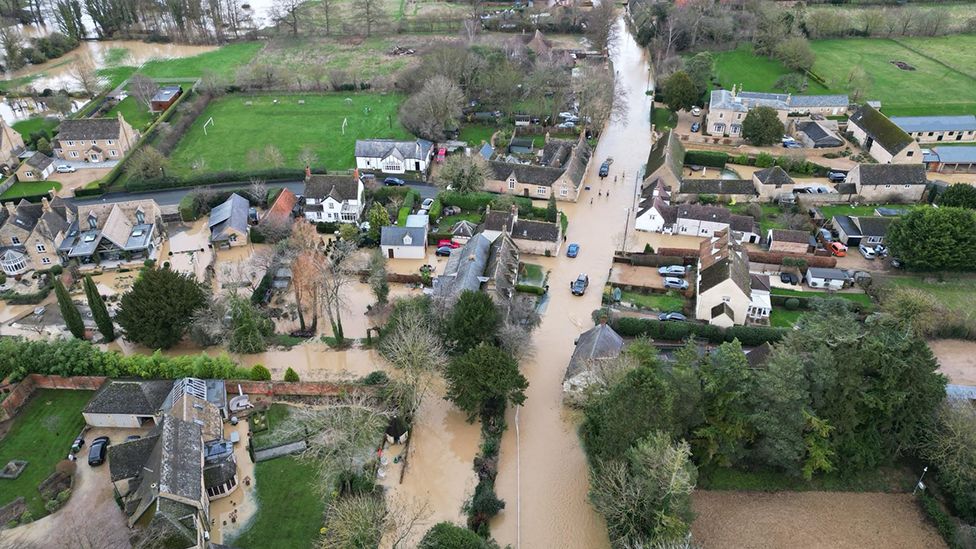ARTICLE AD BOX
 Image source, Adam Brookes
Image source, Adam Brookes
Around 30 homes in the Lincolnshire village of Greatford were flooded after Storm Henk, fire chiefs said
By Kevin Peachey & Jemma Dempsey
Personal Finance Correspondent & Business Reporter, BBC News
The storms that have swept the UK in recent weeks have brought widespread flooding and left residents and businesses counting the costs.
Many affected will be contacting their insurance companies for advice. But cover and compensation can vary significantly depending on the level of impact and small print in policies, although other automatic protection may be in place.
My home or business premises is flooded. What should I do?
Safety is the key priority, so residents and business owners and their employees should only return to the property when it is safe to do so.
The Association of British Insurers (ABI) says most home buildings, contents and commercial business policies cover storm damage.
Commercial policies cover damage to premises and stock. Business interruption cover, which may be included or purchased separately as part of an insurance agreement, will cover additional trading costs.
Comprehensive motor insurance covers the cost of repairing or replacing vehicles damaged by storms.
The ABI has a six-step recovery guide on what to do if your home or business is flooded:
- Contact your insurer as soon as possible: They will advise on emergency accommodation or temporary alternative trading premises
- Assess the damage: A loss adjuster will assess the claim
- Cleaning and stripping out: Work should start within four weeks
- Disinfecting and drying your home: This can take from a few weeks to several months
- Repair and reconstruction: A builder appointed by your loss adjuster should begin after you get your drying certificate
- Moving back in: This can take between a few weeks and a year or more, depending on the extent of the damage
The ABI's general insurance policy adviser Louise Clark said insurers expect bad weather and events like these "are exactly what your insurance is for".
"Their priority right now is to help any affected customers recover as quickly as possible," she added.
People walked the streets of Gloucester on Thursday to inspect the flood damage
But insurance loss assessors Harris Balcombe told the BBC flood victims should be prepared to wait to have their claims assessed because industry resources were in "dire straits".
Partner Alex Balcombe said: "The sense I'm getting is that although the storms have not been as severe, there's been a larger number and this incremental 'drip, drip, drip' has left people waiting a long time.
"Adjusters can't give policy holders the assurance they need."
In the meantime, policyholders are advised to avoid throwing things away where possible.
But Mr Balcombe suggested the situation was being made worse because many consumers are under-insured, having bought the "cheapest product they can find online".
Do I receive compensation if my power was cut off?
Some homes have been without power during these storms, making life particularly uncomfortable during the extreme weather.
There are rules in place that mean compensation may be paid by the local electricity distributor.
The level of compensation is £70, with further payments of £70 if the situation continues for a long time. However, whether this is payable, and when, depends on the severity of the situation in each area.
The Energy Ombudsman, an impartial referee following complaints, points out that residents without power should be kept updated on the situation and on their right to compensation by their local distributor.
Do I have to go to work?
Employees are urged to contact their workplace if they have problems getting to work and employers should try to provide alternative working arrangements where possible, according to the latest advice from the conciliation service Acas.
"Extreme weather has caused disruption across much of the road and rail networks which will impact workers' ability to travel to work.
"Some employers will also have concerns about staff absences impacting their productivity and performance," a statement from the organisation said.
Image source, Getty Images
Image caption,A woman checks on a flooded car in car park in Worcester city centre
Acas's top tips for workers affected by the bad weather include:
- Informing your boss as soon as possible if you cannot get into work
- Checking if there are alternative travel options
- Asking about flexible working arrangements
- Considering any urgent work that needs to be covered
The service also says if you're available to work but your place of work is closed, then you will usually be entitled to normal pay.
My travel plans were disrupted, what are my rights?
A host of rail routes have been affected by the recent storms, owing to fallen trees and debris on the line, as well as flooding.
Image source, Andrew Turner/BBC
Image caption,Part of the line at Haddiscoe in Norfolk was closed in December as a precaution due to high water levels
A number of train operating companies in affected areas have issued advice for customers.
Generally, refunds are available for cancelled trains, or if you do not want to travel owing to the weather.
For delays, irrespective of the reason, many companies offer an automatic compensation service, although a claim still needs to be made. It can be more complicated for those with season tickets.
Some companies still operate under rules where they are not obliged to give any kind of refund if the delay is beyond their control, and severe weather does fall into that category.
If you are booked on a specific service which is cancelled, then you must check with staff instead of simply getting on the next available train to your destination.
Is there help available if my flight was cancelled?
There is more clarity for planes than for trains.
If a flight is cancelled then you can take a refund, or an alternative route or flight to your destination. You must talk to the airline, rather than booking it yourself.
The airline should look after you, such as providing meals if it is a long delay, but they do not have to pay the extra compensation that would be due had the delay been the airline's fault.

 1 year ago
35
1 year ago
35








 English (US) ·
English (US) ·